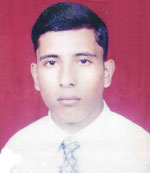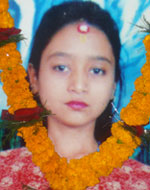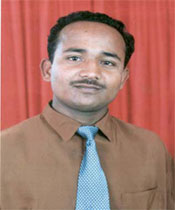Related Links
Case Updates
Krishna Adhikari
 On 6 June 2004, Krishna Prasad Adhikari, a resident of Fujel village of Gorkha District, was murdered in Chitwan District by Maoist cadres. Krishna Prasad was visiting his grandparents after having taken the SLC examinations, and he was abducted from Bakullahar Chowk by men who came on a motorcycle ...
On 6 June 2004, Krishna Prasad Adhikari, a resident of Fujel village of Gorkha District, was murdered in Chitwan District by Maoist cadres. Krishna Prasad was visiting his grandparents after having taken the SLC examinations, and he was abducted from Bakullahar Chowk by men who came on a motorcycle ... Maina Sunuwar
 Around 6 am on February 17, 2004, a group of RNA soldiers arrested Ms
Maina Sunuwar, a 15-year-old schoolgirl of Kharelthok VDC-6, Kavre
district. She disappeared since her arrest. Her family members, with
support from villagers and school where Maina was a student, visited
detention centers ...
Around 6 am on February 17, 2004, a group of RNA soldiers arrested Ms
Maina Sunuwar, a 15-year-old schoolgirl of Kharelthok VDC-6, Kavre
district. She disappeared since her arrest. Her family members, with
support from villagers and school where Maina was a student, visited
detention centers ... Sanjeev Kumar Karna
 Sanjeev Kumar Karna was one among the 11 persons arrested on October 8, 2003. On that fateful day, they had gone to attend a picnic program organized by the students at a place called Kariyachauri VDC-4, and from picnic, they went to Kataiya Chowri Area of Dhanusha district where they ate some food ...
Sanjeev Kumar Karna was one among the 11 persons arrested on October 8, 2003. On that fateful day, they had gone to attend a picnic program organized by the students at a place called Kariyachauri VDC-4, and from picnic, they went to Kataiya Chowri Area of Dhanusha district where they ate some food ... Arjun Bahadur Lama
Arjun Bahadur Lama, 48 years in age, permanent resident of Chhatrebas
VDC -5, Dapcha in Kavre district was abducted by a group of Maoist
cadres, three in number, on 29 April 2005 (2062.1.16 BS) from the
premises of Sri Krishna Secondary School at Chhatrebas VDC-1 of the
district.
» more
Hari Prasad Bolakhe
Hari Prasad Bolakhe, 35 (while missing) a permanent resident of Phulbari VDC-8, Kavre district, a pastor by profession, had been missing since the arrest December 27, 2003, was reportedly killed by security persons. A team of National Human Rights Commission discovered a human skeleton in a jungle ...
» more
Sarala Sapkota
Around 11 p.m. on July 15, 2004, a group of 12 armed soldiers arrested
Sarala Sapkota at her grandfather’s house. The family, who witnessed the
arrest, stated that soldiers gave Sarala no reason for her arrest.
After her arrest, Sarala’s family went to Baireni barracks and the DPO ...
» more
Birendra Shah
On the evening of 5 October 2007, Mr. Birendra Shah, 34, resident of Inruwasira VDC-8, Bara district, a local journalist of Bara district and correspondent of Nepal FM, Avenues Television and Dristi weekly, was abducted by Maoists from Pipara Bazaar in Kalaiya, the district headquarters of Bara ...
» more
Bishwanath Parajuli, Tom Nath Poudel and Dhan Bahadur Tamang
Three persons namely Bishwonath Parajuli (also called Nagendra
Parajuli), Tom Nath Poudel and Dhan Bahadur Tamang of Hasandaha VDC,
Morang were shot dead by the security personnel on 28 September 2004.
According to the eyewitnesses, other victims and the villagers, about 16
people were arrested ...
» more
Chot Nath Ghimire and Shekhar Nath Ghimire
Chot Nath Ghimire, a 58-year-old farmer, resident of Ishaneshor VDC-4,
Ratamate Majhpokhari of Lamjung district was allegedly arrested by the
Joint Security Forces of Joint Security Camp stationed at Bhorlatar VDC,
Lamjung district on February 2, 2002 (2058.10.20). The security camp
called Mr. ...
» more
Bhauna Tharu
Bhauna Tharu (Bhauna Chaudhary in the citizenship card), 21 years old
male (at the time of the incident; Date of Birthe: 8 September 1978),
son of Purna Bahadur Chaudhary, permanent resident of Sujanpur village,
Neulapur VDC-4, Bardiya district, and an employee of Rastriya Gobar Gas,
Gulariya, ...
» more
An Oral Statement to the 20th Session of the UN Human Rights Council by the Asian Legal Resource Centre (ALRC), a Non-Governmental Organization in General Consultative Status
Please view the oral statement below by Ms. Juliette Thibaud:
date: June 28, 2012
HRC section: Item 4, General Debate
Speaker: Ms. Juliette Thibaud
Thank you Madam President,
In Nepal, the dissolution of the Constituent Assembly without having produced a new constitution and growing political instability, threaten security gains and human rights, as noted by the High Commissioner this session.
Serious human rights violations, notably caste-based and gender-motivated violence, continue to be documented and are insufficiently addressed. In the first half of 2012, according to Advocacy Forum 25.6 per cent of interviewed men and 15.6 per cent of women detainees reported being tortured. Given the lack of reforms, notably to the police, these violations have typically resulted in impunity, which the current situation will only prolong and reinforce.
No notable progress has been made to investigate and hold accountable those responsible for torture, rape, extrajudicial killings and enforced disappearances during the conflict. In the absence of a parliament to establish transitional justice institutions, we urge the government to commit to effectively investigate and prosecute cases that have been registered with the police so far.
Heightened tensions and social and political fragmentation in the country, risks to human rights defenders and journalists, and increased repression of demonstrations accompanied by restrictions to the freedom of expression, are all of grave concern, notably given the closure of the OHCHR’s country office in late 2011.
« Back to overview
date: June 28, 2012
HRC section: Item 4, General Debate
Speaker: Ms. Juliette Thibaud
Thank you Madam President,
In Nepal, the dissolution of the Constituent Assembly without having produced a new constitution and growing political instability, threaten security gains and human rights, as noted by the High Commissioner this session.
Serious human rights violations, notably caste-based and gender-motivated violence, continue to be documented and are insufficiently addressed. In the first half of 2012, according to Advocacy Forum 25.6 per cent of interviewed men and 15.6 per cent of women detainees reported being tortured. Given the lack of reforms, notably to the police, these violations have typically resulted in impunity, which the current situation will only prolong and reinforce.
No notable progress has been made to investigate and hold accountable those responsible for torture, rape, extrajudicial killings and enforced disappearances during the conflict. In the absence of a parliament to establish transitional justice institutions, we urge the government to commit to effectively investigate and prosecute cases that have been registered with the police so far.
Heightened tensions and social and political fragmentation in the country, risks to human rights defenders and journalists, and increased repression of demonstrations accompanied by restrictions to the freedom of expression, are all of grave concern, notably given the closure of the OHCHR’s country office in late 2011.
























Join Us